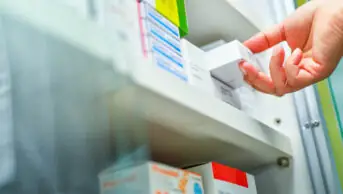
Shutterstock.com
The government’s pricing system for medicines is creating a “false economy” that is driving shortages, causing unsustainable costs for the NHS and taxpayers, and contributing to pharmacy closures, according to a report by the Company Chemists’ Association (CCA).
The report, published on 19 March 2025, entitled ‘Trying to save pennies is costing taxpayers pounds: the false economy of squeezing medicines prices’, said government policies and decision-making “has led to a ‘perfect storm’, creating a level of shortages not seen before”.
“It is becoming apparent that many shortages seen in the UK market are not caused by unforeseeable events happening elsewhere in the global supply chain. The shortages are created by the continued squeeze on drug tariff prices,” the report added.
Analysis conducted by the CCA found that the number of price concessions — which are granted for generic medicines when pharmacists are unable to source them at the price listed in the drug tariff — rose from 195 to 1,640 concessions per year from 2014/2015 to 2023/2024 — an increase of over 740%.
The organisation said there was evidence that constantly reducing the tariff price of medicines had led to price concessions, with any savings made through price reductions consequently “wiped out by the subsequent cost of shortages” (see Box).
Meanwhile, the CCA said that low pricing meant the UK market was no longer attractive to manufacturers and suppliers, which makes the domestic market less competitive and more susceptible to disruptions, as well as impacts the availability of medicines for the NHS.
It also argued that there was no sufficient margin available to reward effective buying, with the core value of retained margin remaining static for the last decade, despite a nearly 14% growth in the number of medicines dispensed by community pharmacies.
The CCA said the number of medicines being dispensed at a loss to pharmacies “has reached a point of being unsustainable”.
The report called for an end-to-end review of the UK supply chain to establish how resilience can be enhanced at every stage, in order to secure the supply of medicines for patients.
It also raised two short-term actions to improve the situation: avoiding ultra-low drug tariff pricing to make the UK market more attractive to global manufacturers and suppliers; and increasing the retained margin for community pharmacy.
Medicines impacted by shortages in recent years include insulin, children’s medicines for ADHD and HRT treatments — shortages that the report highlighted are not only stressful for patients but “potentially damaging to their health”.
Malcolm Harrison, chief executive of the CCA, said: “Saving pennies is costing the taxpayer pounds with patients facing a ‘new normal’ of rolling medicine shortages. Pharmacies find themselves at the sharp end — either being forced to dispense medicines at a loss or simply unable to source medicines for patients that urgently need them.”
Commenting on the report, Nick Kaye, chair of the National Pharmacy Association said: “This CCA report helpfully explains an important international dimension to medicines shortages in this country. There are also many other reasons why patients experience medicines shortages, so we agree about the need for an end-to-end review of the medicines supply chain.
“Fundamentally, there is not enough money in the UK system to sustain a functioning system of medicines supply. Our complicated drug tariff arrangements may once have made sense in theory, but in practice, this is no longer fit for purpose and is squeezing the lifeblood out of independent pharmacies.”
Liz Breen, professor of health service operations at the University of Bradford’s School of Pharmacy and Medical Sciences, commented: “Community pharmacies hold a vital role in our social fabric. They are essential within our community to support patients. They offer much more than products/prescriptions, so it’s not in anyone’s interest for these to not be financially viable and closed to our patients.
“If the current economic models adopted in the UK makes them an unattractive trading partner and places a financial burden on these vital small businesses, then it must be revisited.”
She added: “The recommendations made are welcome and would offer greater insight into UK pharmaceutical supply chain but would benefit from extension.
“The extent to which the UK is losing trade from current or new pharmaceutical partners is not transparent, and we would also benefit from clarity of other barriers to entry in this market.”
According to Office for National Statistics data, people in England are now reporting fewer problems obtaining NHS prescriptions at their local pharmacies.
However, medicines shortages continue to be an area of concern. In December 2024, two coroners expressed concerns over shortages of epilepsy and ADHD medication, following the death of two patients.
In February 2025, a letter from a cross-party group of 45 MPs was sent to health secretary Wes Streeting, which called on him to commission an urgent review into medicines shortages.
The annual ‘RPS Workforce Wellbeing Survey’, published on 18 February 2025, also found that more than half (56%) of respondents said their mental health had been adversely affected by having to deal with medicines shortages over the past year.
In February 2023, The Pharmaceutical Journal reported that one in five generic medicine price concessions are imposed by the government, rather than agreed through negotiation with the then Pharmaceutical Services Negotiating Committee (now Community Pharmacy England).
The Department of Health and Social Care did not respond in time for publication.
Box: Atorvastatin
The CCA report highlighted recent shortages of cholesterol-reducing drug atorvastatin (Lipitor; Pfizer), which was prescribed to more than 5 million people in England in 2023/2024.
According to the CCA’s analysis, between September 2020 and April 2023, the amount of atorvastatin prescribed increased by nearly a fifth (17%); however, there was a 7% decrease in spend, owing to the reduction of the drug tariff price.
During a 16-month period between January 2022 and April 2023, the government reduced the rate it paid for 28 x 20mg tablets from an average of £1.27 to 92p.
At least one major manufacturer of atorvastatin tablets stopped selling to the UK during this time, the CCA said, which led to an immediate reduction in supply and availability for pharmacies and, in turn, lead to patient access problems.
A market shortage of atorvastatin followed and the price surged, which was followed by a price concession. In January 2024, after supplies stabilised and the price concession ended, atorvastatin re-entered the drug tariff at £1.64.
The report said that reducing the price of atorvastatin by an average of 35p per pack (just over 27%) saved the NHS £7.2m over the 16-month period; however, it cost an additional £24.5m during the eight-month price concession period.


